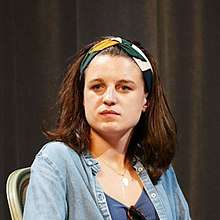Eugénie Bastié
Eugénie Bastié (born 18 November 1991) is a French journalist and essayist.
Eugénie Bastié | |
|---|---|
 Bastié in 2017 | |
| Born | 18 November 1991 Toulouse, France |
| Occupation | Writer, essayist, editor, critic |
| Nationality | French |
| Education | Sciences Po |
A Le Figaro employee, she is at the same time chief editor of the integral ecology magazine Limite, of Catholic inspiration. In 2016, she published a critical essay on feminism, Adieu mademoiselle. A conservative, she is part of a generation of young Catholic intellectuals sometimes regarded as néo-réactionnaires by part of the media.[1] The Nation in 2018 described her as "a rising star."[2]
Childhood and education
Daughter of a landscaper and a specialist in nuclear medicine, Eugénie Bastié has four brothers and sisters; she grew up in Pibrac, in the Haute-Garonne[3] in a solidly Catholic family.[4]
Career
She partook in 2013 in the La Manif pour tous.[5] From 2013 to 2015 she collaborated with Causeur,[6] an internet site and biweekly magazine directed by Élisabeth Lévy. Following a stint at Figarovox, the opinion and debate site of Le Figaro (considered by Nolwenn Le Blevennec, from L'Obs, as the "hard right platform of Le Figaro"[7]), she was hired by Le Figaro in 2015,[8] recommended by Alexis Brézet.[7]
In 2015, Bastié co-founded the French ecologist "Limite" magazine.[9]
Bastié has compared Marine Le Pen "a little bit" to Hillary Clinton.[10]
The Huffington Post has reported that Bastié's comments on #metoo have "created a controversy."[11]
Works
- Adieu mademoiselle. Paris: Le Cerf. 2016. p. 224. ISBN 978-2-2041-0489-0..
- Le porc émissaire. Paris: Le Cerf. 2018. ISBN 978-2-204-12838-4..
References
- Arnaud Gonzague (5 November 2016). "Médias : la nouvelle tribu réac". Le Nouvel Observateur. Retrieved 5 September 2017..
- Karina Piser (2 November 2018). "In France, Is the #MeToo Movement Passé?". The Nation. Retrieved 25 April 2019.
27-year-old journalist Eugénie Bastié, something of a rising star in the conservative media
- Johanna Luyssen, « Eugénie Bastié, déjà croisée » sur Libération, 18 mai 2016.
- Audrey Kucinskas « Qui est Eugénie Bastié, la chroniqueuse déjà comparée à Éric Zemmour ? », L'Express, 3 septembre 2016.
- Meddy Mensah, « Qui est Eugénie Bastié, la « fille spirituelle » d'Éric Zemmour ? » sur planet.fr, 29 avril 2016.
- Fiche sur Eugénie Bastié sur Causeur, consulté le 20 mai 2016.
- Nolwenn Le Blevennec (2015). "FigaroVox : rech. jeune plume qui vomit son époque". Le Nouvel Observateur (in French)..
- Fiche sur Eugénie Bastié sur Le Figaro, consulté le 20 mai 2016.
- Amélie Quentel (30 September 2018). "Martine Storti : "Elisabeth Lévy, Eugénie Bastié et Valeurs actuelles ont une vision victimaire des hommes"". Les Inrockuptibles (in French). Retrieved 25 April 2019.
Eugénie Bastié [journaliste au Figaro et fondatrice de la revue Limite, ndlr]
- Susan Chira (4 May 2017). "Marine Le Pen's Canny Use of Gender in Her Campaign". The New York Times. Retrieved 25 April 2019.
"She's been around so long that it's a little bit like Hillary Clinton – we forget that she's a woman," said Eugénie Bastié,
- Lucie Cayrol (24 September 2018). "Eugénie Bastié provokes a controversy with her comments on #MeToo". HuffPost (in French). Retrieved 25 April 2019.